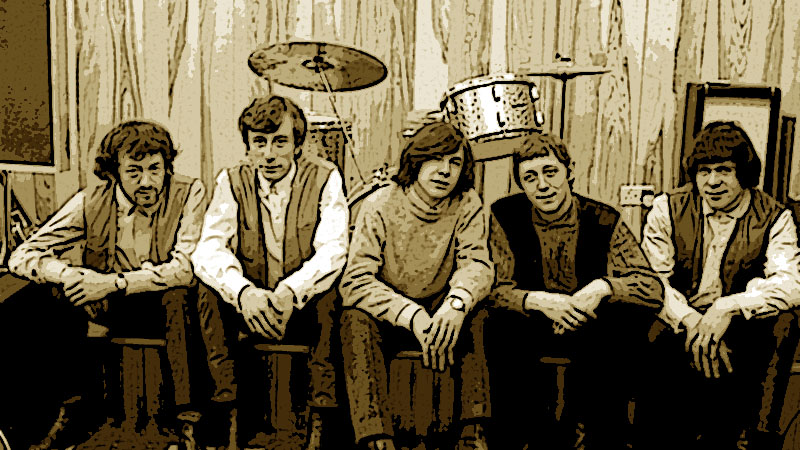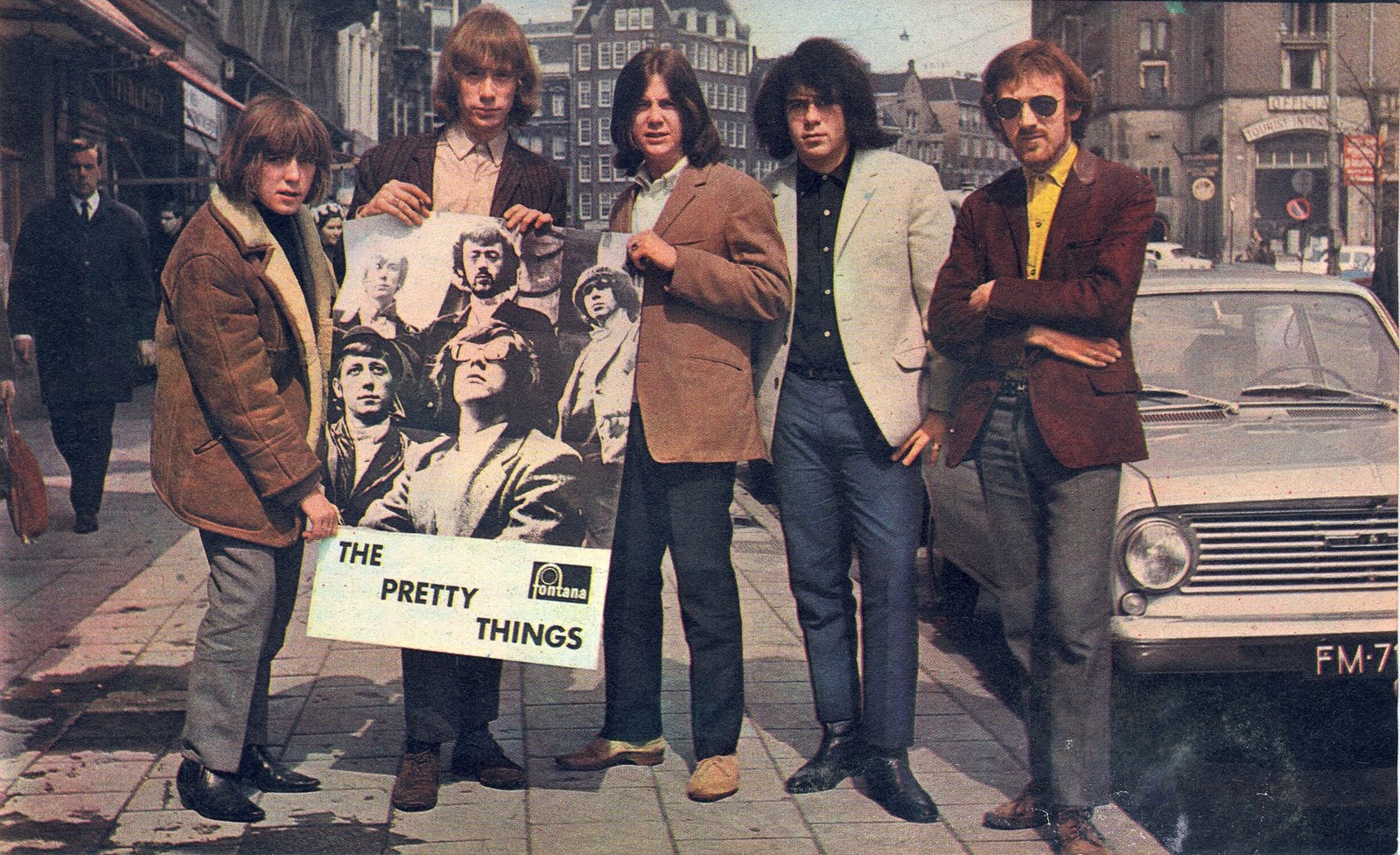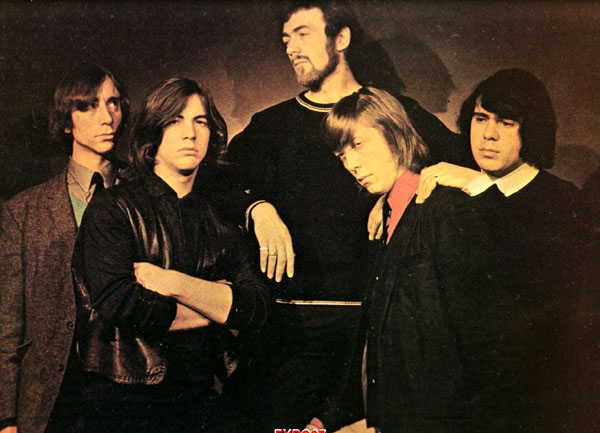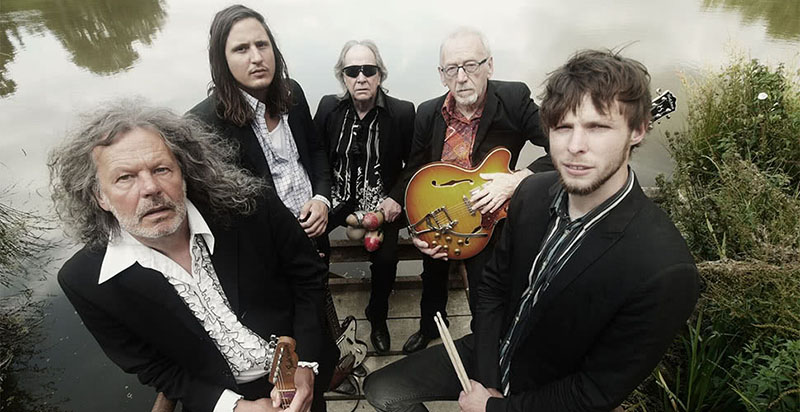
In the middle of 1968 The Pretty Things were seated in a conference room with EMI executives and production engineer Norman Smith at EMI’s corporate headquarters in Manchester Square, London. The Pretty Things were presenting their new album, and their first with EMI, a concept album based around the story of a fictional character by the name of Sebastian F Sorrow: SF Sorrow.
Standing at a lectern in the conference room, Smith, in-house engineer at Abbey Road studios where the album was recorded, read snippets from the story before the corresponding song on the album was played. But it was apparently immediately that the corporate stiffs had no empathy for The Pretty Things’ ground-breaking album.
“They’re all sitting there in their suits, looking a bit bemused,” recalls singer Phil May. “We weren’t sure how well it went down, so the next morning I get a phone call. Because we were going to have both the story and the lyrics on the cover, they rang me and asked me I really thought the story was important enough to print on the cover. I was gobsmacked. Why did we read it to them? What was the point of that whole exercise, and now you’re asking me ‘Was it important?’ Imagine if it came out with the story – it would have been really confusing! What the bloody hell is going on?”
As it was, "SF Sorrow" was released with minimum fanfare. Written and recorded well before The Who’s 'Tommy', EMI’s diffident reaction to the album ensured "SF Sorrow" would remain a cult classic for the next few decades. “EMI put out little ads to compound the felony – just said ‘New Pretty Things album’. That was it, nothing about what it was, anything. So that’s how much they got it!” May laughs.
The recording of "SF Sorrow" came after a particularly difficult period in The Pretty Things’ short and tumultuous career. Formed in 1964 – guitarist Dick Taylor famously left The Rolling Stones to form a band with his fellow art school student Phil May – The Pretty Things were wild, unpredictable and exciting. But the recording of The Pretty Things’ third album, "Emotions", left a sour taste in the band’s mouth. The band’s label, Fontana, effectively hijacked the production of the album, adding a brass overlay that The Pretty Things felt was at odds with the music they’d written.
 The Pretty Things in Swinging London 1965.
The Pretty Things in Swinging London 1965.
Rather than fight the label, The Pretty Things decided to suck it up and sever their ties with Fontana as soon as the record was released. “If we’d have fought them, we’d had to have stayed,” May says. The Pretty Things were already moving away from the group’s pop and r’n’b roots. Bass player Wally Waller and Jon Povey, formerly of The Fenmen, added a spark to the Pretties’ artistic dynamic. May and Taylor, increasingly frustrated with the expectations of a pop group, were looking to explore new territory.
“We were already into the ribs of changing out direction,” May says. “We knew we had to take it somewhere, take the new music somewhere it’d be appreciated, to a better environment. If we hadn’t have found a new direction, we probably would have run out of steam. We weren’t a pop band, we were fed up with being chased down the streets by hundreds of girls, waving scissors.”
Like The Who with "A Quick One While He’s Away", The Pretty Things had already flirted with conceptual music with their single ‘Defecting Grey’. May had recently written a story, Sergeant Sorrow, based on the life cycle of a first Wold War soldier, Sergeant Sorrow. The Pretty Things decided to use the story as the basis for a concept album.
“When we started to make this new record, we’d already decided it wasn’t going to be five A-sides and five B-sides,” May says. “What we needed was some way to take it, so you could put the needle on one side, and you’d go through all the way through on a journey to the other. So somebody’s life seemed the perfect vehicle to do that, because it allows you to experience all sorts of emotions on the way, and to represent them in song.”
With minimal financial support from their new label, EMI, The Pretty Things entered Abbey Road studios to record the album. Also in the studio at the same time were The Beatles, recording its White Album, and Pink Floyd. Because The Pretty Things were using “studio downtime”, the band would record only when the studio was free. But with most of the EMI advance taken up with paying ongoing debts, The Pretty Things was forced to go back on the road throughout the recording process to ensure the band maintained financial subsistence.
Once in the studio, The Pretty Things observed a symbiotic relationship between the story of Sebastian Sorrow – now demoted from his original officer status – and the music they were writing.

“The story and music pushed each other. So as you wrote a piece of music, and it didn’t have any lyric, we didn’t know what it was about, and then suddenly once we got what it was about, like ‘Brace of Fingers’, which was about kids’ masturbation, that became part of his growing up,” May says. “It expressed all those feelings that kids have when they’re starting to become sexually aroused. A lot of these things were written down in a lyrical way, and then the music came along afterwards, inspired by the music or the storyline. So each music and narrative pushed each other. It evolved on the floor.
“So the story became a lead vehicle for it, and from then on the music came along and pushed the narrative, the narrative was in place in some places and other places wasn’t. And then we’d come up with some music. We knew he had to meet the devil or some reflection of himself. In Haitian folklore there was someone called Baron Saturday.
"Once we’d got Baron Saturday as a character who was going to play quite a part in this, we had to find music for it. And then the music came along, and that fitted. And then the lyrics fitted with the music. It was really weird because things were going along in parallel and then meeting, and then becoming a song.”
Another critical element in the evolution of "SF Sorrow" was production engineer Norman Smith. Superficially, Smith seemed a straight-laced studio type, unlikely to embrace the lateral artistic direction The Pretty Things were pursuing. But, May suggests, without Smith SF Sorrow may never have been realised.
“It was only when we met Norman Smith, the only person we’d spoken to who got it. Norman, at the time was quite straight, he was quite an unlikely ally,” May says. “He’d been the Beatles’ engineer, he was part of a corporate record label, EMI, which is a bit like the Home Office – it had very stable people in it. Yet he saw what we were trying to do. I’ve always said that we didn’t sign to EMI, we signed to Abbey Road and Norman Smith, and that’s the only two bits we were interested in.”
 Today's Pretty Things with Phil May at the back left.
Today's Pretty Things with Phil May at the back left.
"SF Sorrow: was released eventually in December 1998, six months before The Who’s "Tommy". But without any substantial publicity from EMI, "SF Sorrow" made little impression on the charts. The album was launched with what some considered to be an ill-advised strategy: a mime performance at London’s famed Roundhouse venue. May, who along with other members of the band and production crew was on acid for the performance, doesn’t regret the mime event, though concedes it didn’t help the album's prospects.
“Technically, there wasn’t the equipment around to do much with it, so we did a mime act, our girlfriends played parts, and we did it against a light show which was kind of pretty ad hoc. “People say now ‘It was such a great gig’, but I think ‘Christ, was it? I can’t remember’. It was back to our art school roots. They didn’t promote it, so we had to do it ourselves, a back like an amateur theatrical production company. When I look back, we must have been lunatics!”
The Pretty Things, who unlike many of their contemporaries had never made a serious attempt at cracking the American market, were signed by EMI to a Motown records subsidiary, Rare Earth Records. By the time SF Sorrow was released in the US a year later, it was erroneously assumed by audiences that The Pretty Things were simply following on the coat tails of The Who.
May and Waller were already writing the songs that would become The Pretty Things’ next album, Parachute. But Dick Taylor, who wasn’t involved in the writing of the new album, had had enough, and served notice. “When I look back on it, for me [Dick Taylor leaving] was a kick in the balls. To me it was another one leaving the ship.” “But at the time I rode it because Wally and I had already half-way written Parachute. And when you have something like that, like a child, you’re going to make it see the light of day, you’re not going to give up.”
Parachute was lauded critically in a way that SF Sorrow wasn’t being given album of the year status by Rolling Stone magazine. The Pretty Things eventually made an impression in the US in the 1970s while back in England David Bowie, who covered a couple of Pretty Things’ tracks on his Pin Ups album, did his best to keep the band’s name in pop music consciousness.
May and Taylor eventually reunited in the 1980s, and by the 1990s The Pretty Things had recovered the rights to their music. In September 1998 The Pretty Things performed "SF Sorrow" live in its entirety for the first time, with the assistance of narrator Arthur Brown and guest guitarist David Gilmour from Pink Floyd. The Pretty Things will also be performing "SF Sorrow" at a special show at the Thornbury Theatre in Melbourne as part of their upcoming Australian tour.
“Because we can’t have all the strings and mellotron, we’ve found our own way of playing it. When we come to Australia we’ll be playing "SF Sorrow: as Pretty Things rock band, playing it as a rock gig, not with all the strings because we can’t put them in our suitcase,” May says. “It’s not reinvented but it’s an updated version of SF Sorrow now. The songs are there, but obviously we can’t embellish them the way we did on the record.”
The Pretty Things’ Australian tour will mark the band’s first Australian tour since 2012 – their visit to New Zealand in 1965 is the stuff of rock’n’roll infamy, in no small part due to the manic antics of then-drummer Viv Prince – and May says his health renders ongoing touring no longer a viable proposition. But May is adamant that The Pretty Things aren’t finished just yet.
“Dick and I are certainly going to on, whether as The Pretty Things I don’t know or some change of direction,” May says. “I have emphysema, and where I have a problem is the travelling, not the playing. We’re playing non-stop til we get to the end of the year, and I just can’t do that next year.”
“But The Pretty Things aren’t dead. We’ve got half a record made already, and we’re starting another one. The Pretty Things’ name will be about, we just won’t be doing long, electric tours. We might not also being playing totally electric in the future. But The Pretty Things’ spirit will go on. It’s like a kind of family thing.”
The Pretty Things Australian Tour
Wednesday, October 3rd
(with Tumbleweed and DJ Owen Penglis)
The Factory, Sydney, NSW
Thursday, October 4th
(with The Golden Age Of Ballooning)
The Zoo, Brisbane, QLD
Saturday, October 6th
(with Sand Pebbles & The Electric Guitars)
Thornbury Theatre, Melbourne, VIC
Sunday, October 7th (Afternoon)
(with The Breadmakers)
The Caravan Club, Melbourne, VIC
Wednesday, October 10th
(with The Living Eyes)
Barwon Club, Geelong, VIC
Friday, October 12th
(with The Living Eyes & Bananagun)
The Tote, Melbourne, VIC
Saturday, October 13th
(with Somnium)
Fowlers Live, Adelaide, SA
Sunday, October 14th
The Charles Hotel, Perth, WA
Tickets here

